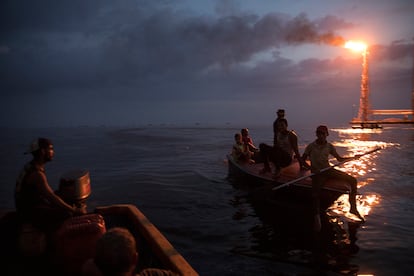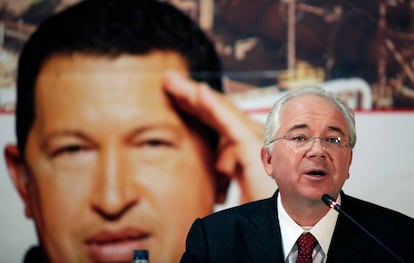Andorra freezes $55 million worth of bribes received by members of the Maduro regime
The authorities of the tiny European country are withholding illicit funds that were deposited by 21 Venezuelan individuals into Andorran banks. These former vice-ministers – who served under Hugo Chávez – allegedly took bribes from subcontractors hired by PDVSA, the state-owned oil company

A criminal network made up of former vice-ministers who served under President Hugo Chávez – who governed Venezuela from 1999 until his death in 2013 – is being investigated for looting more than $2.2 billion in public funds. They allegedly took this money from the state-owned Petróleos de Venezuela SA (PDVSA) – the crown jewel of the oil-rich Latin American country.
While some of these embezzled monies are unrecoverable, the government authorities of Andorra have frozen more than $55 million in alleged bribes that were collected in the European country by 21 members of the scheme. This is according to a confidential report by the Andorran police, which EL PAÍS has managed to access.
The funds allegedly come from illegal commissions, which were paid to the network by contractors who received million-dollar contracts from PDVSA and its subsidiaries between 2007 and 2012. The money from this corruption scheme was deposited in Banca Privada d’Andorra (BPA) – almost 5,000 miles away from Caracas.
Businessman Diego Salazar – a first cousin of Rafael Ramírez, the former head of PDVA who once served as Venezuela’s minister of petroleum – heads the list of members of the network. He currently has more than $20 million being withheld by Andorran authorities.

Next on the list is Salazar’s business manager – attorney Luis Mariano Rodríguez Cabello – who has about $8.6 million blocked by the tiny landlocked European country. Andorra – with a population of only 77,000 – had secretive banking laws up until 2017.
José Ramón Arias Lanz – a former technical manager of the Venezuelan Petroleum Corporation and planning manager for PDVSA – currently directs an oil company in Ecuador. He has had more than $7.7 million frozen by the Andorran authorities. According to the investigators who drafted the report in May of 2022, Arias Lanz – who resides in the United States – controlled this money in Andorra through accounts in the name of inactive corporations, such as Ansonia Assets Foundation and White Snake Properties Inc.
Javier Alvardo – a former Chavista strongman who served as deputy minister of Electric Energy and Petroleum between 2007 and 2010 – will not be able to withdraw the $6.3 million he has stashed in Andorra. The former politician – who moved more than $50 million through BPA – channelled his funds through a convoluted series of shell companies.
The Andorran authorities have also blocked $5.3 million from Rubén Darío Figuera Olivari, a former member of the board of directors of Venezuela’s National Pipeline Institute. Figuera Olivari washed his ill-gotten gains through inactive companies, such as Gashell International Inc. and the Reston Foundation. He received millions of dollars in transfers from Salazar’s accounts, masked as consulting fees.
Luis Abraham Bastidas Ramírez – another cousin of Rafael Ramírez – will similarly not be able to withdraw the $2.77 million that he deposited in Andorra. “He received a succulent commission, [transferred to him] from accounts under the management of Luis Mariano Rodríguez Cabello,” the investigators highlight in the report.
Like him, another Venezuelan affected by the embargo is Nervis Villalobos, a former vice minister of energy, who also presided over PDVA’s electrical subsidiary. A leftover from the hierarchy of the early days of Chávez’s government, Villalobos currently has $2.2 million frozen in Andorra.
According to the Police Corps of Andorra, “national and international investigations reveal that, during Villalobos’ tenure at the oil company, he obtained million-dollar commissions – bribes – [from] those who won contracts from PDVSA.” Through his accounts in Andorra, Villalobos has moved more than $137 million since the early 2000s.
The list of those who have had their funds frozen also includes Gerardo Elías Esteves Duque – former general secretary of the metropolitan district of Caracas, who received $567,630 from other parties in Andorra – and Luis Enrique Tenorio Rodríguez, who was first secretary of the Embassy of Venezuela in China, who will not be able to touch the $109,850 he has in BPA.
According to investigators, Tenorio Rodríguez was allegedly responsible for getting Chinese companies to pay bribes to win contracts with public companies in Venezuela. “Behind [his diplomatic role], he was hiding a huge business of illegal commissions,” the agents note. Another official with ties to China – Francisco Javier Jiménez Villaroel, who managed PDVSA’s representative office in China between 2005 and 2013 – has had $3,360 withheld.
The blacklist also includes Carlos Enrique Luengo Herrera – who was executive vice president of human management at PDVSA’s electrical subsidiary – and Pablo Noya González, Luengo Herrera’s assistant, as well as Ramón Elías Morales Rossi, former secretary of citizen security in Caracas. They each have between $50 thousand and $100 thousand frozen.
Others being investigated include the financial intermediaries of this network, such as Luis Alejandro Rivero García – with $83,310 frozen – and his brother, Leonardo, with $7,630 frozen.
Omar Jesús Farías Luces – a businessman known as the “insurance czar” – has been classifed as “Diego Salazar’s strategic partner” by Andorra’s police. His right-hand man – the insurance broker José Luis Zabala – will not be able to touch the $581,480 dollars he has in the European country, according to the latest report from investigators. “His financial movements stand out for his fondness for luxury, especially for the acquisition of jewelry, works of art and high-end Swiss watches.”
Gabriel Guillermo Salas Ely – the business partner of Luis Alejandro Rivero – has had $122,750 withheld. María Mercedes Matheus Batista – who was the risk and insurance manager of PDVSA – and Ninoska Corromoto García – an administrator working for José Luis Zabala – each have had the modest sums of $381 and $1,430 frozen respectively. They had minor facilitating roles in the plot that oversaw the looting of Venezuela’s state oil company.
Made up of former Chavista leaders and officials of the powerful state firm, the network of corruption was charging illegal commissions of more than 10% from subcontractors – especially Chinese firms – who were later awarded PDVSA contracts, as revealed by this newspaper. The network hid its illicit money through a convoluted web of accounts at BPA.
Through 30 opaque companies based in tax havens such as Switzerland or Belize, the organization flowed funds into Andorra. In order not to arouse suspicion, multi-million dollar incomes were camouflaged under the umbrella of consulting jobs that, according to investigators, never actually existed.
Since 2018 – after its banking laws were toughened – Andorra has prosecuted about 30 members of this Venezuelan money laundering scheme, which has been intertwined with the country’s banking establishment.
Sign up for our weekly newsletter to get more English-language news coverage from EL PAÍS USA Edition
Tu suscripción se está usando en otro dispositivo
¿Quieres añadir otro usuario a tu suscripción?
Si continúas leyendo en este dispositivo, no se podrá leer en el otro.
FlechaTu suscripción se está usando en otro dispositivo y solo puedes acceder a EL PAÍS desde un dispositivo a la vez.
Si quieres compartir tu cuenta, cambia tu suscripción a la modalidad Premium, así podrás añadir otro usuario. Cada uno accederá con su propia cuenta de email, lo que os permitirá personalizar vuestra experiencia en EL PAÍS.
¿Tienes una suscripción de empresa? Accede aquí para contratar más cuentas.
En el caso de no saber quién está usando tu cuenta, te recomendamos cambiar tu contraseña aquí.
Si decides continuar compartiendo tu cuenta, este mensaje se mostrará en tu dispositivo y en el de la otra persona que está usando tu cuenta de forma indefinida, afectando a tu experiencia de lectura. Puedes consultar aquí los términos y condiciones de la suscripción digital.








































